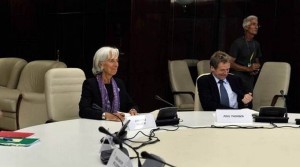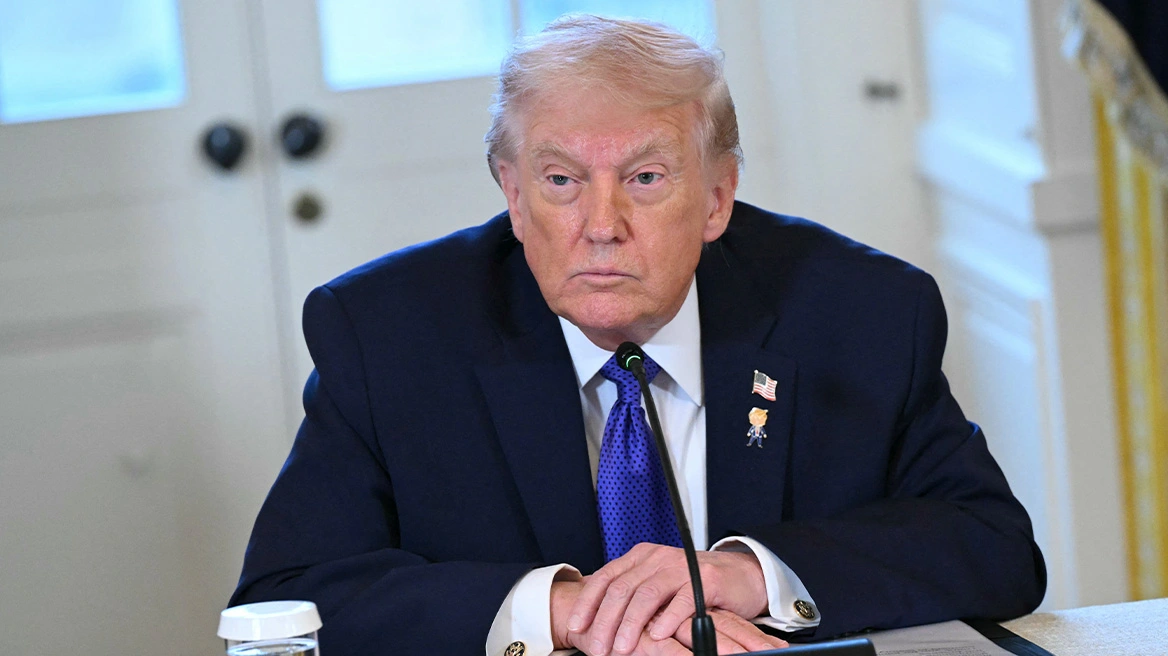I’m going to move on to Greece where we have a large number of questions, most of them around the same sort of nexus of issues. I’m going to take the question from Jeremy Tordjman of AFP, but I should mention that there are questions also from the Washington Post, Kathimerini, Reuters, from Dagens Nyheter in Norway, Asahi Shimbun,. Let me capture the main issues via Jeremy Tordjman and actually a question from Heather Scott of Market News and The Guardian in London. So the questions on Greece, if I may, are:
The IMF has repeatedly stressed the importance for build-out countries to have ownership of the programs. How do you expect, how does the IMF expect, this ownership to materialize in Greece given that the authorities have indicated little faith in the program and have publically stated in the past that they did not want to have the IMF onboard?” So that was Jeremy Tordjman’s question. And there’s a question from Asahi Shimbun that says, “Regarding Greece’s debt; there were agreements the creditors should have restructured Greece’s debt earlier, which turned out to be true. Does the IMF stance this time reflect that lesson? And then finally, what actions or policies would be necessary to convince the IMF to participate in a future program in Greece?”
IMF CHIEF CHRISTINE LAGARDE: Good morning, Jeremy. First of all, I have received a letter from the Greek authorities and from the Finance Minister to invite the IMF to come and work with the Greek authorities on a proposed program. So that’s number one, we are being invited. Number two, I have been in politics myself, a little bit, and there are lots of things that you say and what matters at the end of the day is what you do — so deeds, no creeds. And what will be critical in my view is what the Greek authorities actually are prepared to do, not the words around it, not the political noise that is often a necessity. But to demonstrate ownership and to demonstrate determination you propose pieces of legislation, you debate them, and then you vote, the parliament votes them or not. That’s stage one. Stage two, you implement the decisions that have been made. And I think that’s what will really indicate the ownership of the authorities to make sure that the Greek economy turns around, that it starts creating jobs, and that it restores the complete financial sovereignty of the Greek economy so that at some stage it can go back to market, finance itself without any support. So that’s the nature of ownership.
On the issue of debt, first of all there was a debt restructuring in 2012. It was essentially a public sector debt owed to the private sector, and there was a massive restructuring at the time. We are currently looking at a situation where we have analyzed the debt as unsustainable. I think I have repeatedly said that for Greece to succeed and for any program to fly, a significant debt restructuring should take place. So I don’t think that we have varied. And we will stick to that position because that’s really becoming a commonly accepted view that with a debt that climbs from 170-ish and might peak at 200 percent with the track record of the country, it’s inevitable that there is an element of debt restructuring, which takes me to the latter part of your questions.
I think for a program to succeed and for Greece to be able to turn around its economic and social situation and to reach the stability that is hoped for, it will take four key components. I think it will take sensible fiscal targets that are delivered upon with clear measures that will be identified early on. It will require structural measures to unleash the potential of the Greek economy, which is far too constrained by lots and lots of barriers, turfs, protections. And on the other side, it will require sufficient financing so that the program is actually credible; and the element of debt restructuring, which will allow the Greek economy to walk on not necessarily two legs as I have said, but four legs. It takes fiscal, structural reforms, financing, and debt restructuring.
I think that covered a lot of ground for Greece. I’m going to turn to Ukraine, another country in the news, and this question is from Moritz Koch of Handelsblatt. And he is asking, “A deal with the private bondholders is still not reached. A default seems more and more likely. The IMF has indicated that it is prepared to continue disbursing money to Ukraine even in that case. So my question is this, how would a failure of the debt negotiations impact the timeline for Ukraine’s return to the markets, and would a further extension of the program and even more public aid be necessary in that event?”
MS. LAGARDE: Well, let me step back for a second because I think Ukraine has been in an incredibly encouraging situation. From a poor track record over the last 20 years or so where we had many aborted attempts to help the country, we have been now in partnership with Ukraine for more than a year and we have seen political determination to change the face of Ukraine notwithstanding the very difficult security and military situation on the eastern border of that country. But clearly political players who understand that if they want to turn the economy around, if they want to restore stability, they have to attack on all fronts — fiscal, structural reforms, corruption — the whole equation. And what we have seen is actual delivery. The Ukrainian authorities have actually delivered. Now is it to say that it’s fine and everything is okay? No. There are forces that are trying to destabilize, but I think that we are seeing a very strong political determination. We are due to have the first review of the second program next Friday, this Friday, to approve the first review of that program, which I hope will be very conclusive and will be supportive of the efforts.
Now, clearly the private debt is under negotiations and the Ukrainian authorities are in a dialogue with the bondholders, a difficult dialogue. We are encouraged that that negotiation is making progress, and we very much hope that it continues to make progress and that the bondholders are sensible as to what can be achieved rather than expected in the medium to long term. Having said that, if it didn’t work despite the encouraging progress recently made, then there is a possibility to go into a legislative process that institutes a debt moratorium. We hope that it’s not a required step in the process, but we have a policy at the Fund as you know that is about lending into arrears and we will apply that policy, which allows us to continue to support Ukraine despite that situation.
For the full transcript, CLICK HERE
Ask me anything
Explore related questions





